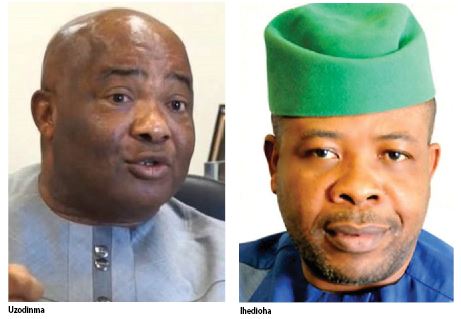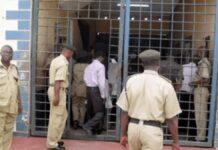
After All Progressives Congress‘ (APC) experience at the Supreme Court over its appeal on the Bayelsa State governorship election this week, the Peoples Democratic Party‘s (PDP) appeal for the apex court to reverse its judgement that sacked Emeka Ihedioha as Imo State governor, comes up next week. CHIBUZO UKAIBE writes
With the appeal of the All Progressives Congress (APC) and its candidate, for a review of the Supreme Court judgement on the Bayelsa State governorship election dispensed with, all eyes have reverted to Imo State, where the Peoples Democratic Party (PDP) and its candidate had asked the apex court to review its verdict on the governorship election in the state.
APC had returned to the Supreme Court asking the court to reverse its judgment disqualifying David Lyon, its candidate in the 2019 governorship election in Bayelsa State on grounds that his running mate, Biobarakuma Degi-Eremienyo, had issues with his certificate. The court eventually declared the PDP candidate, Senator Douye Diri winner.
On the other hand, PDP returned to the apex court on Imo governorship poll, asking it to reverse its verdict declaring the APC candidate, Hope Uzodinma as governor of the state after. The party faulted the court’s recognition of results that were earlier rejected by the Independent National Electoral Commission (INEC) which led to nullification of PDP candidate, Hon Emeka Ihedioha’s governorship mandate.
While the dismissal of APC’s appeal on the Bayelsa election appears to have set the stage for intrigues ahead of the Imo judgement which is scheduled for next week, the PDP, in its reaction to the verdict insisted that its appeal for review of the Imo verdict is in order.
This was in spite of the firm disposition of the justices in the Bayelsa judgment, (including fines slammed on the lawyers of the respondent) on the finality of their verdict.
From Street Protests to Court room
PDP national chairman, Prince Uche Secondus, was mindful of not undermining the apex court when he addressed party members and supporters during the Abuja rally on January 20 verdict which sacked Ihedioha as Imo State governor.
Secondus tactically told party supporters during the rally that PDP was only against the error observed in the judgement but not the justices.
He said, “We’re not against you, we’re against the error. And by the special grace of God, I know you will revisit the error. And all we are saying is that for you to review this error because the figures are not adding up.
“We therefore, called on the leadership of the judiciary, to please, revisit and reverse the Imo State judgement because we believe that the figures are not adding up. That’s why we’re here so that the world will hear us,” the party chairman noted.
Earlier, the party has argued that the apex court, inevitably, increased the number of votes in the March 9, 2019 governorship election, by 127, 209 votes.
The number of accredited votes was 823,743, out of which, 739,485 was votes cast while 25, 130 was cancelled votes, leaving a 714,355 as valid votes.
But with the addition of 127, 209 to Uzodinma’s 96, 458 votes (whom the Independent National Electoral Commission (INEC) said, came fourth in the election), the total number of votes in the election increased to 950,952 votes.
It was on this basis that the party mobilised its members and embarked on series of street protests, in Imo, Taraba, Anambra, Sokoto, Ogun, against the judgement. Besides the protest in states, the party leadership submitted petitions at the American and French Embassies, British High Commission, and at the headquarters of United Nations (UN) and European Union (EU) in Nigeria.
On February 5, the party and its candidate made good its resolution by formally filing an appeal at the Supreme Court, asking it to review the January 14 judgement.
Former attorney- general and minister for Justice, Chief Kanu Agabi (SAN) filed the appeal on the behalf of PDP and Ihedioha, praying the court to set aside “as a nullity the judgement delivered by this Honourable Court on the 14th of January 2020, in Appeal No. SC.1462/2019 and Cross Appeal No. SC.1470/2019.”
The suit has the Imo State governor, Senator Hope Uzodinma as the 1st appeallant/respondent, while the APC and INEC are the 2nd and 3rd appeallants/respondents, respectively.
PDP and Ihedioha, in their motion on notice, argued that the Supreme Court had no jurisdiction to declare Uzodinma as elected in “an election petition which was based on two inconsistent and mutually exclusive grounds, to wit, (i) that the 1st Applicant was not duly elected by majority of lawful votes cast at the election, the implication of which is that the majority of votes cast at the election were valid; and,
(ii) that the election was invalid for noncompliance with the Electoral Act, the implication of which is that the election be annulled.”
They further argued that the apex court “did not have the jurisdiction to declare the 1st Appellant/Respondent as elected in the absence of any proof that the votes ascribed to him met the mandatory geographical spread stipulated in section 179 (2) of the Constitution of the Federal Republic of Nigeria (as amended).”
Further, the applicants contended that the Supreme Court “did not have the jurisdiction to declare that the 1st Appellant/Respondent met the constitutional geographical spread without providing in its judgement the reason(s) for that conclusion.
“The fraudulent nature of the additional votes was demonstrated by the fact that the total votes cast as shown in the first appellant/respondent’s computation was more than the total number of voters accredited for the election and in some polling units more than the total number of registered voters.
“The fraud was also demonstrated by the fact that the result computed by the first appellant/respondent showed only the votes of the first applicant and the first appellant/respondent without specifying the votes scored by the other 68 candidates who participated in the election.”
The appeal was slated for hearing on February 18 but was later shifted to March 2, to allow both the respondents and applicants file their responses and replies.
The applicants are contesting the results from 388 polling units, which the Supreme Court relied on to declare Uzodinma winner of the March 9, 2019 governorship election. This amounted to 213, 495 votes, which APC and Uzodinma believed, were unlawfully excluded from their votes during the election.
But PDP argued that exhibits 63RD1 to 63RD19 (which is INEC Forms EC40G) showed that there were no valid elections in the 388 polling units. (INEC had told the court that the result from the 388 polling units did not originate from it.)
The party’s argument on spread was that even if Uzodinma’s votes were allowed to stand, he did not get the spread in the required number of local government areas in Imo State.
To be declared governor of a state, section 179 (2) of the constitution stipulates that in addition to winning the highest number of valid votes cast in an election, the candidate must also secure 25 per cent of votes in two-third of the local government areas in the state.
Imo State has 27 local government areas. Two-third therefore is,18. PDP’s argument is that Uzodinma has spread in only two local governments, and could not be declared winner because he lacks the required spread.
But some advocacy groups argued that the court should rather order a rerun between the two political parties that have the highest number of votes (that is PDP and APC) since neither Uzodinma nor Ihedioha met the required spread. While Uzodinma has spread in only two, Ihedioha met the spread in 14 local government areas.
PDP’s lawyer, in his final submission, reminded the jurists that “Never in the history of this court have your Lordships delivered a judgment which evoked the protest of the public. This one has. Therefore, we urge you, we appeal to you to take a second look at it.
“There is no doubting the fact that your Lordships, being human, will from time to time fall into error. Prove to the world that when that happens you will not lack the courage to correct yourselves. That is the unique opportunity that this case offers you.”
He further cited the case of Adegoke Motors v. Adesanya, where the Supreme Court stated that “it is far better to admit an error than to preserve an error.”
PDP is asking the Chief Justice of Nigeria (CJN), Justice Mohammed Tanko and six other justices that delivered the January 14 judgement, to recuse themselves from the panel that would review the judgement.
The party said its demand was based on Section 36(1) of the Constitution of the Federal Republic of Nigeria, which guarantees fair hearing to every citizen or entity in the determination of his rights or obligations.
“Furthermore, the time honoured and tested principles of natural justice, particularly that no man shall be a judge in his own cause is particularly relevant to this solemn request. Allegation of bias or likelihood of bias goes to the root of fair hearing.
“Denial of right to fair hearing is a logical consequence of bias in any proceeding before a court or a tribunal,” PDP argued.
Expectedly, Uzodinma and APC have as well, filed a cross appeal, asking the court to dismiss the PDP petition on the ground that it is status barred. They argued that the window allowed by law for election petition has elapsed.
In a 19-paragraph affidavit filed in opposition to Ihedioha’s application, the governor and his party asserted that the 60 days allowed for the Supreme Court by the Constitution has since lapsed.
“The undisputed facts relating to the Respondents/Applicants’ Motion hereinafter referred to as “the motion” are to the effect that the judgment of the Court of Appeal was delivered on 21st September, 2019 while the one sought to be set aside was delivered on 14th January, 2020.
“Clearly, the 60 days allowed by Section 285(7) of the 1999 Constitution (as amended) for this Honourable Court to hear and determine appeal from the Court of Appeal in an election matter, lapsed on 17th January, 2020. The Motion to set aside was filed on 5th February, 2020, 19 days after the time allowed by the Constitution.
“It is now a settled law that the 60-days limit to determine and conclude litigation on election matters is sacrosanct and cannot be extended by any guise”, they insisted in the counter affidavit filed on their behalf by the lawyer, Mr. Damian Dodo (SAN).
In the counter affidavit deposed to by one Mathew Mola, the two respondents, said the apex court is not in the habit of sitting on appeal over its own judgment as demanded by Ihedioha.
The respondents claimed that since January 14 when the apex court delivered the landmark judgement that brought Senator Uzodinma to power, the court has since ceased to have the constitutional power to adjudicate on the declaration of Uzodinma as the winner of the March 9, 2019, governorship election in Imo State.
“As the highest court in the land, the Supreme Court jealously guides its process against abuse by litigants”, he said, “and does not indulge in academic exercise or answer by hypothetical questions.”
The counter affidavit denied the allegation that Uzodinma admitted that he allocated votes to himself or that the votes in the 388 polling units were in excess of the registered voters.
Describing Ihedioha’s allegations as wild and baseless, the deponent said that Uzodinma and APC did not mislead the Supreme Court to perpetuate any fraud in the appeal that brought them to power.
Specifically, they claimed that by section 285 of the 1999 constitution the Supreme Court can no longer adjudicate in the matter having become statute barred.
For what it is worth however, the Supreme Court had been asked to review its judgement in the past.
Pundits point to the case involving Kobina Johnson vs Irene Lawanson and others in 1970s where the Supreme Court, after a request for review, reflected on its earlier position that for a deed to be relied on by section 129 of the Evidence Act, it must be 20 years old at the date of proceedings. It was reversed to be 20 years old at the date of the contract.
Delivering judgement in the case, Justice Coker held that “when the court is faced with the alternative of perpetuating what it is satisfied is an erroneous decision which was reached per incuriam and will, if followed, inflict hardship and injustice upon the generations in the future or of causing temporary disturbances of rights acquired under such decision, I do not think we shall hesitate to declare the law as we find it.”
The apex court therefore ordered a re-hearing of the appeal by another panel of the Justices of the Supreme Court.
But whether this will apply in the Imo case is another matter. What is clear is that by next week, the case might finally be over, just like in Bayelsa State.
Kindly contact us @ Naijalivetv@gmail.com
Call or Whatsapp: 07035262029, 07016666694, 08129340000










